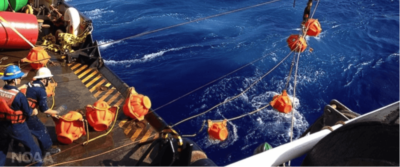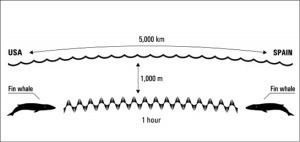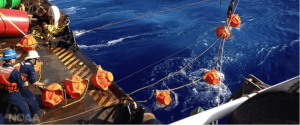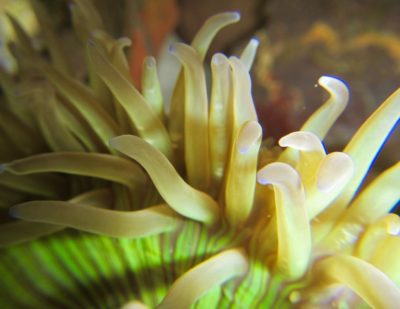
Did you know that sound travels over four times faster through water than through air? Next time you poke your head underwater, notice how it is difficult to tell which direction sound is coming from – that’s because it’s traveling so fast that there is no time for you to notice which ear it hits first!
Sound travels so quickly through water because there is more “stuff” – or “medium” – to conduct the sound waves. Have you ever played the game “telephone”, where one person passes along a message to another, and so on? Think of five hikers standing one mile apart on a trail, versus a baseball stadium row full of people packed close together. If both groups try playing telephone, through which group will the secret message travel faster? Through the one with more members closer together – like water molecules!
 Molecules are more densely packed together in ocean water, a liquid, than in air, a gas. This allows sound waves to pass more quickly through water. “Ironically”, sound travels even faster through iron, a dense solid, than water!
Molecules are more densely packed together in ocean water, a liquid, than in air, a gas. This allows sound waves to pass more quickly through water. “Ironically”, sound travels even faster through iron, a dense solid, than water!
Many marine animals like fish, dolphins, and whales communicate and navigate using sound. For example, fish make specific popping sounds to find members of their same species to school with. Dolphins use echolocation – bouncing sound waves off of objects to determine their shape and location – to navigate and hunt, while baleen whales sing elaborate songs to call to each other in complex communication rituals. There is even a “sound corridor” at the specific depth where the pressure, temperature, and salinity are perfect for conducting sound slowly over thousands of miles, from Australia to Bermuda, for example, which fin whales use to communicate with other fin whales far away.
 Fin whales use the Deep Sound Channel to communicate with fin whales very far away. (Image credit: David Rothenberg, thousandmilesong.com)
Fin whales use the Deep Sound Channel to communicate with fin whales very far away. (Image credit: David Rothenberg, thousandmilesong.com)
Since so many marine organisms use sound to survive, they are also often very sensitive to it. A shark’s best sense, for instance, is not in fact its sense of smell but its hearing! As our oceans are absorbing the excess CO2 in the atmosphere and becoming more acidic, sound is actually amplified, so loud and persistent sounds such as military sonar are having harmful effects on animals that are sound-sensitive such as dolphins and whales.
A microphone that records sound underwater is called a hydrophone. This spring, scientists from Oregon State University and the National Oceanic and Atmospheric Administration placed a hydrophone at the deepest place in the ocean, the Mariana Trench, southwest of Guam. To listen to what they heard, visit http://www.npr.org/sections/thetwo-way/2016/03/04/469213580/unique-audio-recordings-find-a-noisy-mariana-trench-and-surprise-scientists.
 Scientists lower hydrophones into the water at a special mooring over the Marianas Trench (image credit: NOAA)
Scientists lower hydrophones into the water at a special mooring over the Marianas Trench (image credit: NOAA)


